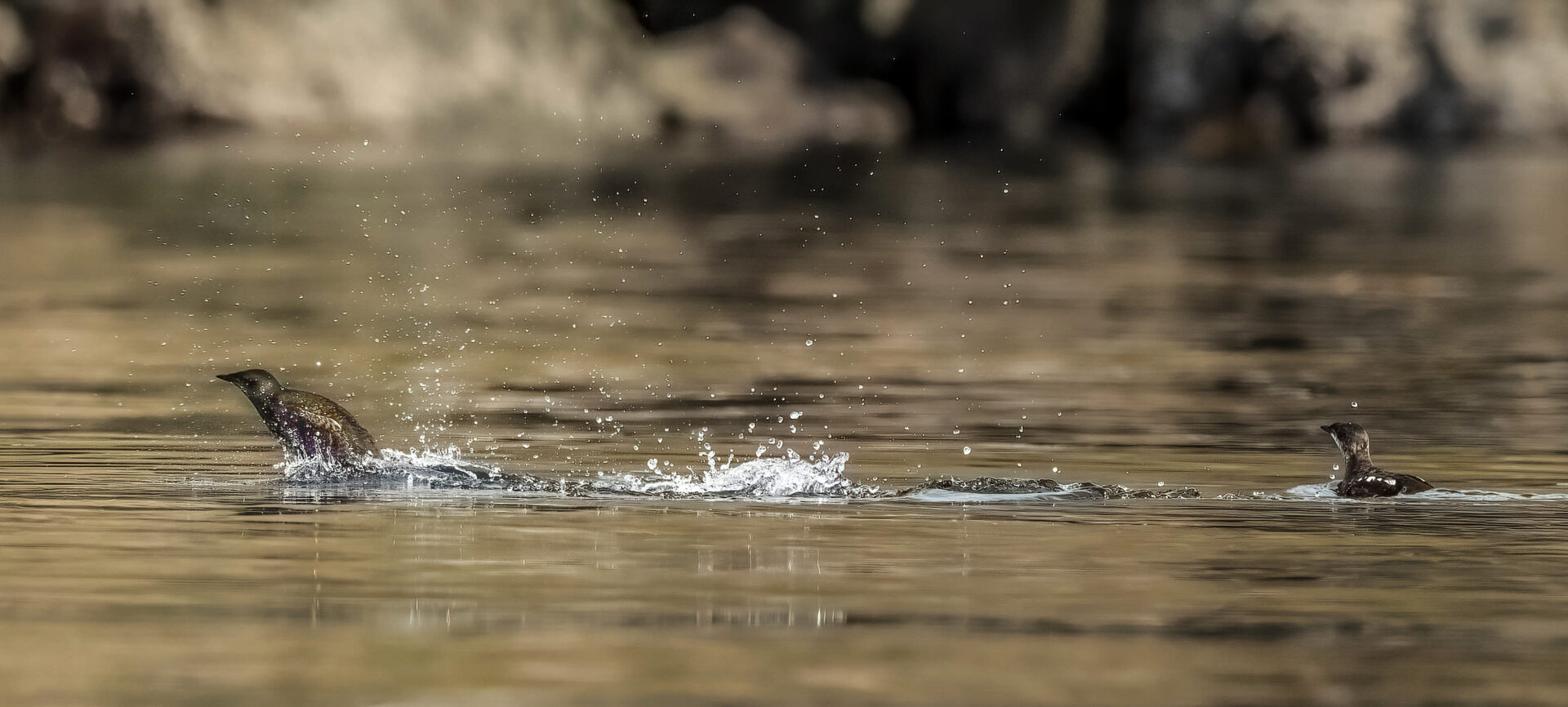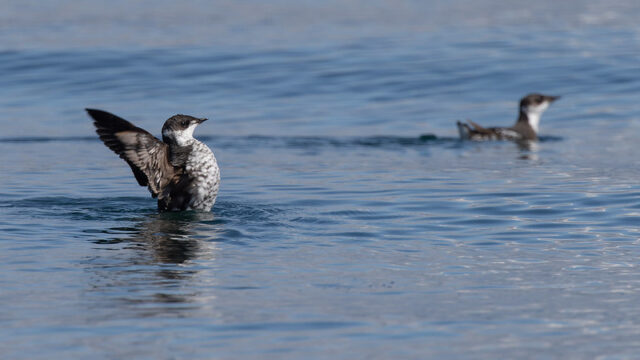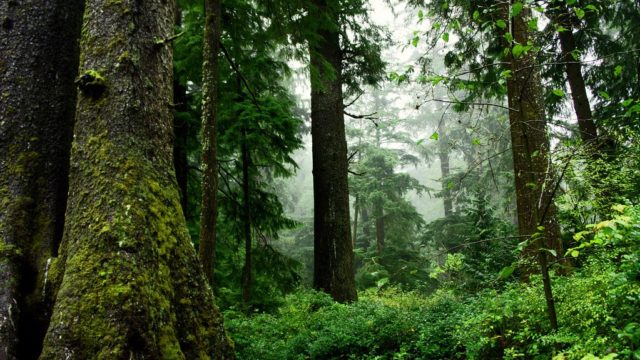The groups will challenge the federal government’s failure to protect threatened birds and their habitat under the Species at Risk Act.
VANCOUVER/UNCEDED xʷməθkʷəy̓əm (MUSQUEAM), Sḵwx̱wú7mesh (SQUAMISH) AND səlilwətaɬ (TSLEIL-WAUTUTH) TERRITORIES – Ecojustice lawyers, on behalf of Sierra Club BC and Wilderness Committee, are in Federal Court today to advocate for the protection of migratory birds and their habitats across Canada.
The groups are suing the federal government for failing to protect the critical habitats of at-risk migratory birds across the country. This includes the threatened Marbled Murrelet, a seabird that relies on coastal old-growth forests in B.C. for nesting.
The groups’ main contention is that a “protection statement” issued by federal Environment Minister Steven Guilbeault too narrowly interpreted the Species at Risk Act (SARA). The groups will argue that the minister has unlawfully limited the federal government’s protection of bird habitat by protecting only their nests and not the wider habitat they need to survive and recover. As a practical matter, for many bird species, including the Murrelet, it’s nearly impossible to spot nests in towering individual trees from the ground, so habitat protection based on identifying individual nests alone is completely ineffective.
If the case succeeds, it will force Minister Guilbeault to take steps to protect the critical habitat of at-risk migratory birds, well beyond the small area covered by their nests. This would help ensure the survival and recovery of the marbled murrelet and many other at-risk migratory bird species.
Globally, biodiversity is declining faster than at any time in human history. B.C. is no exception. The province is home to the richest biodiversity in Canada and the highest number of species at risk. Federal and provincial governments must strengthen protections for biodiversity and ecosystems now. The groups are in court to ensure that elected officials meaningfully protect species and their critical habitats.
Sean Nixon, Ecojustice lawyer said:
“This case is about how seriously the federal government takes its responsibilities to protect at-risk migratory birds and their habitat. The long decline of the Marbled Murrelet shows what happens when the federal government sits back and does nothing meaningful to protect a threatened bird species.”
Charlotte Dawe, Conservation and Policy Campaigner, Wilderness Committee said:
“As wildlife spiral to extinction the federal government is coming up with new inventive ways to deny their protection. Enough is enough, over half of migratory birds in Canada are declining and we will not let the federal government dodge their legal responsibilities any longer.”
Jens Wieting, Senior Forest and Climate Campaigner, Sierra Club BC said:
“With a growing number of endangered species like the Marbled Murrelet slipping through the cracks in B.C., we’re depending on the federal government to follow through on commitments like those under the Migratory Birds Convention Act. Until British Columbia enacts effective biodiversity legislation, Marbled Murrelets, and many other species need other levels of government to step up to the plate and act for their survival and recovery.”
Background:
Habitat loss is the main cause of decline for more than 95 per cent of at-risk species on land. Protecting threatened and endangered bird species requires protecting the ecosystems they depend upon for survival and recovery, including forests and other wildlands.
Under the Species at Risk Act (SARA), the minister is required to ensure protection of critical habitat for at-risk migratory birds on provincial lands to which the Migratory Bird Convention Act (MBCA) applies. However, the Minister has taken the position that the federal government has no obligation to protect anything other than bird nests on provincial lands.
This is bad news for all at-risk migratory birds in Canada. Among these is the Marbled Murrelet, a small, threatened, migratory seabird that nests high in the mossy branches of old growth trees in British Columbia. The birds only approach or leave their nests under the cover of darkness, making the nests nearly impossible to find and difficult to protect.
The main threat to the Marbled Murrelet’s survival and recovery is logging of their nesting habitat. Surveys conducted in some of the last intact old-growth areas on Southern Vancouver Island in 2021 revealed over 300 marbled murrelet detections overtop of a proposed cutblock in the Ada’itsx (Fairy Creek) area on Pacheedaht territory. This habitat was outside the deferral area and was set to be logged by Teal-Jones Group. No action was taken to stop logging because the nests themselves could not be identified. The cutblock was logged roughly a week after the federal and provincial governments were notified of the marbled murrelet detections.
Plant and animal species are the foundation of a healthy ecosystem. When a species like the Marbled Murrelet becomes threatened, it is a sign the ecosystem is deteriorating. Each species that is lost triggers spillover effects within its ecosystem, including the loss of other species.
B.C. is the most biodiverse province in Canada and the one with the most species at-risk. These two facts are linked. The province is one of the few in Canada without specific legislation to protect the habitat of endangered species, which leaves B.C.’s biodiversity virtually unprotected and vulnerable to the impacts of logging, mining, and other industrial activities.
In 2020, the B.C. government committed to implementing all 14 recommendations outlined in the provincial Old-Growth Strategic Review (OGSR), including to “Declare conservation of ecosystem health and biodiversity of British Columbia’s forests as an overarching priority and enact legislation that legally establishes this priority for all sectors.” While work on a framework continues there is still uncertainty when effective legislation might be enacted. This makes the federal government’s responsibility under SARA to protect critical habitat of at-risk species in the province all the more important.
Recent years have seen a rise in tangible habitat threats such as wildfires, heatwaves, and the logging of old growth forests, leaving endangered species increasingly vulnerable to extinction. A recent analysis of 492 wildlife species protected under SARA found that the status of 64 per cent of them has not improved, while the status of 18 per cent has worsened. By allowing the continued destruction of critical habitat for at risk species, the government is accelerating the biodiversity crisis.
This case has larger implications for habitat protection for bird species across Canada. If the groups are successful, the federal government would have to take steps to ensure protection of the habitat and ecosystems bird species are embedded in, rather than just applying often-ineffective measures to protect nests. This could in turn lead to the protection of more old growth forests and other habitat important to migratory birds.
About:
Sierra Club BC is an environmental non-profit working to support people stewarding abundant ecosystems and a stable climate, while building resilient, equitable communities. The organization strives to do this by upholding Indigenous rights and title, reconnecting children, and youth with nature, supporting grassroots-led climate action, and advocating for old-growth protection.
Wilderness Committee protects life-giving biological diversity in Canada through strategic research, community mobilizing and grassroots public education. As the people powered wilderness preservation group, we unite 60,000 supporters, volunteers and activists from coast to coast to coast, working together to preserve wilderness, protect wildlife, defend parks, safeguard public resources and fight for a stable and healthy climate. We have offices in Vancouver, Victoria, Winnipeg and Toronto.
Ecojustice goes to court and uses the power of the law to defend nature, combat climate change, and fight for a healthy environment. Its strategic, innovative public interest lawsuits lead to legal precedents that deliver lasting solutions to Canada’s most urgent environmental problems. As Canada’s largest environmental law charity, Ecojustice operates offices in Vancouver, Calgary, Toronto, Ottawa, and Halifax.



